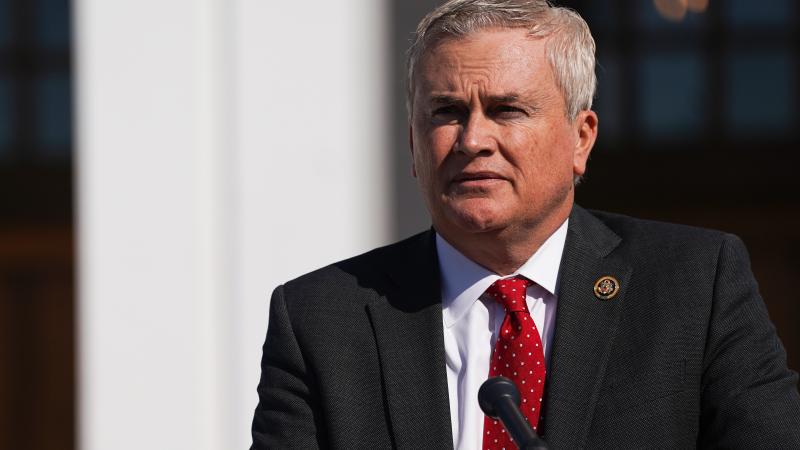Biden's foreign policy record gives Trump ammunition ahead of debate
Trump, for his part, has long cast himself as a peacemaker in contrast to Biden’s interventionist approach to global affairs and is likely to press the incumbent commander-in-chief about the uptick in global tensions under his watch.
President Joe Biden and former President Donald Trump are expected to square off in the first presidential debate of the 2024 election next Thursday and Trump appears poised to hammer his opponent on foreign affairs.
The pair negotiated their participation in the debate over a string of social media challenges to one another and have circumvented the Commission on Presidential Debates, which has traditionally managed the contests. Foreign policy is expected to feature prominently in the discussion amid the backdrop of conflicts in Europe, the Middle East, and rising tensions in the Pacific.
Trump, for his part, has long cast himself as a peacemaker in contrast to Biden’s interventionist approach to global affairs and is likely to press the incumbent commander-in-chief about the uptick in global tensions under his watch.
During the Trump administration, Washington attempted a diplomatic rapprochement with North Korea, sought to foster friendly relations between Israel and its neighbors, and negotiated a withdrawal agreement with the Afghan government and the Taliban.
Under his successor, however, most of those developments have either been stalled or upended, with conflicts erupting across those regions, potentially handing Trump considerable ammunition against Biden in the debate. The campaign, for his part, has been clear that Trump will use it.
“President Trump will contrast his strong record on the world stage that encouraged peace around the world with Joe Biden's weakness that has emboldened our adversaries, weakened our allies, and led to war from Ukraine to the Middle East,” Trump Campaign National Press Secretary Karoline Leavitt told Just the News.
North Korea
Known colloquially as the “Hermit Kingdom,” North Korea has been a geopolitical pariah for decades, maintaining formal relations with a limited number of strategic partners and attracting international concern over its nuclear program and bellicose rhetoric towards its southern counterpart.
Trump and North Korean leader Kim Jong Un generally developed personally amicable relations while Washington pursued a diplomatic pact intended to curb the nation’s nuclear and military ambitions. Those efforts resulted in a 2018 summit in Singapore between Trump and Kim, as well as a 2019 summit in Vietnam, though they did not achieve a formal agreement on denuclearization.
The Biden administration has since resumed military drills with Seoul, which Trump had largely curtailed, resulting in a return to frosty relations. The U.S. and South Korea held their first large-scale drills in August of 2022 after a five-year pause.
Tensions between the North and South have escalated dramatically in recent years, moreover. Earlier this month, for instance, Pyongyang sent trash-laden balloons across the border in response to the south’s blasting K-Pop music across the border.
This week, moreover, Kim signed a mutual defense pact with Russian President Vladimir Putin, which the latter called a "truly breakthrough document.” The development appears to have locked Pyongyang firmly in an adversarial camp against Washington and reversed much of the prior administration’s initiatives.
Afghanistan
The Trump administration in 2020 negotiated a withdrawal agreement to remove U.S. forces from Afghanistan after roughly 20 years. The terms of Trump’s agreement required both the Taliban and Afghan government to meet certain criteria for U.S. help to establish "a peaceful, negotiated government in Afghanistan without U.S. troop presence," former Trump advisor Kash Patel told the John Solomon Reports podcast in 2021.
Under the Biden administration, the U.S. went ahead with the withdrawal, but did so amid a Taliban offensive that saw the armed group seize control of the country. The conflict concluded with tens of thousands of Afghan allies and American personnel evacuated out of Hamid Karzai airport in Kabul. During the evacuation, 13 U.S. service members were killed in a bombing on the airport’s Abbey Gate.
Though a report from United States Central Command (CENTCOM) concluded that the incident was not preventable, the families of some of the victims have nonetheless blamed Biden for his handling of the withdrawal. Gold Star father Steve Nikoui this year interrupted Biden’s State of the Union address shouting “Abbey Gate!” His son, Kareem, died in the attack.
Patel further excoriated the administration for ignoring the detailed plans he says the Trump administration left behind and asserted that Washington’s handover of a key airbase set the stage for the Taliban’s eventual victory.
“We would not have ever relinquished control of Bagram Airfield, because that is our command and control node for the entire region," he said. The Biden administration has largely attempted to blame the Trump administration and a report released last year insisted that "[d]uring the transition from the Trump Administration to the Biden Administration, the outgoing Administration provided no plans for how to conduct the final withdrawal or to evacuate Americans and Afghan allies.”
"We actually did not leave them a deadline," Patel insisted. "It was a negotiation between the U.S. government, the Taliban, and the Afghans. And if that date was not to work for this incoming administration, they could have moved it. But what they chose to do was break the entire agreement. And then they thought, since the adults were back in Washington, D.C., and Blinken and Biden were leading the charge, the world will just fall into place for them.”
Israel
Trump’s tenure also witnessed the signing of the Abraham Accords, a historic set of diplomatic agreements that saw a number of Muslim-majority nations establish formal diplomatic ties with Israel after decades of hostility. The relatively quiet period in the Levant stood in contrast to the current situation, which has seen geopolitical tensions escalate sharply in the wake of the Oct. 7 Hamas raid that triggered the ongoing conflict in Gaza.
Biden’s handling of the issue has drawn criticism from both sides of the political spectrum, with many of his progressive detractors demanding he press Israel to limit civilian casualties and his Republican opponents insisting he hamstrung Jerusalem in its quest to eliminate Hamas. He notably attracted Republican scrutiny in May over a threat to hold up arms shipments to Israel if it went forward with an invasion of Rafah, to which many civilians fled amid Israeli military operations.
"What Biden is doing with respect to Israel is disgraceful," Trump said in May in response to Biden’s threat over the Rafah situation. "If any Jewish person voted for Joe Biden, they should be ashamed of themselves. He's totally abandoned Israel. I guess he feels good about it because he did it as a political decision.”
Biden has further attracted criticism from the left, including from Arab Americans and Muslims, which are traditionally Democratic constituencies. In October of last year, for instance, the National Muslim Democratic Council warned Biden that his “unconditional support [for Israel], encompassing funding and armaments, has played a significant role in perpetuating the violence that is causing civilian casualties and has eroded trust in voters who previously put their faith in you.”
Muslim leaders in Michigan -- with a large Muslim population -- last December launched the #AbandonBiden National Coalition in response to his handling of the conflict. Biden ultimately won the Michigan Democratic primary, though 16.2% of participants cast their votes for “uncommitted” in what was widely seen as a protest vote.
Russia
Trump, for years, faced allegations of collusion with the Russian government to win the 2016 presidential election. Though now-thoroughly debunked, Trump continues to face claims that he is close to Putin.
The former president, for his part, has made much of the Russian invasion of Ukraine, contending that such a development would not have occurred on his watch and that Putin’s aggression signaled his disregard for Biden’s leadership. Russia invaded Ukraine in February of 2022 and the conflict has persisted with no signs of a ceasefire. The invasion followed 10-years of internal conflict in Ukraine after the 2014 Russian annexation of Crimea.
"If I were in Office, this deadly Ukraine situation would never have happened!" Trump said shortly after the invasion began. "[Putin] was going to be satisfied with a piece [of Ukraine] and now he sees the weakness and the incompetence and the stupidity of this administration," he said the same month.
“Putin only invaded Ukraine, because he has no respect for Biden. Would have never happened under the Trump Administration, and for four years it didn’t happen!” he said in March of this year.
Biden has stood by his support for aiding Kyiv, even amid signs of mounting Russian gains in the eastern Ukrainian provinces. Earlier this month, he signed a 10-year security agreement with Ukraine with the aim of strengthening the nation’s “credible defense and deterrence capabilities for the long term.”
Ben Whedon is an editor and reporter for Just the News. Follow him on X.
The Facts Inside Our Reporter's Notebook
Links
- negotiated their participation
- 2019 summit in Vietnam
- first large-scale drills
- trash-laden balloons
- mutual defense pact
- Kash Patel
- 13 U.S. service members were killed
- Steve Nikoui
- he said
- attempted to blame the Trump administration
- Abraham Accords
- threat to hold up arms shipments
- Trump said in May
- attracted criticism from the left
- #AbandonBiden National Coalition
- Michigan Democratic primary
- Trump said
- he said in March
- signed a 10-year security agreement
- Follow him on X















